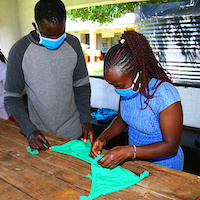Can do better — and will
17 September 2013
An earlier blog discussed extending the careers of Irish public sector workers by using their skills and expertise in overseas development. But what about people already working in the voluntary sector? The Comhlámh site, naturally enough, emphasises development education. Its Good Practice Guidelines for Development Education in Volunteering report is a useful outline of what that actually means - from exploring the root causes of poverty and injustice to understanding interdependence and a lot more. The guidelines also explain how organisations can - and should - make such education core to the experience of their volunteers, and not just an add-on. The efforts at the Irish end of the development chain are impressive. Professionalism and understanding are more and more built in to the process of volunteering. But what about local aid workers — that is aid workers in the countries actually being helped? Yes, more are being deployed. More than ever, local people are getting courses and training. But career development is a key concern. Earlier this year an analysis from IRIS, the humanitarian news and analysis service of the UN Office for the Coordination of Humanitarian Affairs, took a look at decentralizing the northern-centric humanitarian aid sector to give more power to southern staff (http://www.irinnews.org/report/98025/analysis-helping-local-aid-workers-build-meaningful-careers). The results were mixed. Training is there but not necessarily leading to career change. Budget restrictions, lack of internationally agreed standards and lack of interest in longer-term needs from short-term emergency donors can be blamed in part. But with more local staff being deployed more will need to be done to allow them to use their experience to advance their careers. As the IRIS article puts it: “The need to support humanitarians to professionalise, improve standards and obtain professional qualifications is more important than ever.” We in the development aid sector can be proud of how volunteering has evolved. Certainly volunteering has gone well beyond just ‘helping out’ towards something much more professional and focused: the Comhlámh guidelines indicate that. And development groups - including our own - are involving, training and even empowering local workers more than ever before. But we can always do better. And we will.

